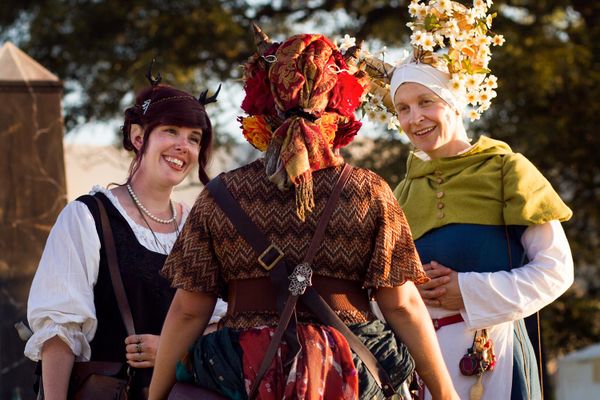Game overview
Introduction
The game is set in a powerful Empire that is surrounded by hostile barbarians on all sides. The Empire has grown in power and size for centuries but has experienced a decline in recent decades with territories along the borders being overrun by barbarians. Around a fifth of the territory the Empire controlled at its height was lost to a series of incursions that an Empire focused on internal politics was ill-equipped to repulse.
The game began shortly after the death of Empress Britta, leaving the collective player base as the most powerful individuals in the Empire. While the Imperial Senate has since elected a new Throne, Lisabetta, the challenge remains - to restore the Empire to its former glory by regaining the lands that have been lost, and to secure its future.
The Empire is formed from ten culturally distinct nations. Each nation has its own culture and customs but they are politically and legally unified. Although the players are all fundamentally on the same side there is rivalry between nations, with players competing with each other to lead the Empire and achieve their own goals.
Events represent the moments when the powerful and significant members of the Empire come together to shape its future. These are times when characters can take bold actions - there will be votes in the Senate and the Synod, opportunities to practise powerful magic, chances to make your fortune and battles to be fought that will determine the outcome of the Empire's military campaigns.
Look and feel
The inspiration for the setting is drawn from the late Byzantine period to the early Renaissance era. In creating the visual styles for the nations we have been inspired by some of the images from the Lord of the Rings movies, the Assassin's Creed and Dragon Age computer games, HBO Borgias and the Game of Thrones television series, the Starz Camelot series and even the BBC Merlin series.
The setting and the style of the game has also been influenced by modern fantasy literature, especially the highly political worlds of Jim Butcher's Codex Alera and Joe Abercrombie's The First Law.
The game is not a historical setting; history is just one of the starting points that has been used to create the distinctive looks and the culture of each nation. We want players to create characters and wear costume that fits the setting and their part within it. To help with this the wiki includes extensive information about each nation, the costumes that are appropriate and advice on how to create the right look. The goal is for everyone involved to be ambitious and work together to create a game that looks stunning and sets new standards for immersion.
The nations of the Empire
The Empire is formed from ten culturally distinct nations. Nations exist to provide the players with their primary source of identity - in the way that players in other fest systems are Malathians, Greeks or Lions, our players are Highborn or Navarr. The game is organised logistically along nation lines, with camps laid out for each nation. Nationality has no rules impact on a character’s skills or abilities, because we want to encourage players to choose their nation purely for its aesthetic and setting rather than for reasons of optimisation.
Nations are not politically independent, but they have a cultural identity that is identifiable and reflected in their dress, customs and attitude. The Empire has a single set of laws that applies to each citizen, and each nation elects senators to represent its political interests as well as generals to direct its armies in service to the Empire.
The Senate
Political control of the Empire is primarily through the Senate. Each nation selects its own senators, each one of whom serves for a year before facing re-election. Senators vote on motions and make decisions that affect the Empire directly. The debates and business of the Senate is facilitated and administered by our NPC Civil Service and officiated by the Speaker for the Senate. Even with the Throne occupied by Imperatrix Lisabetta, the Senate continues to have a vital role in shaping the future of the Empire.
The point of the Senate is to provide a focus for political conflict between characters. It gives PCs the levers to control the Empire - but in uptime, rather than in downtime.
The Synod
The Synod is a political body and meeting place for the faithful of the Empire. It serves as the moral conscience of the Empire, but also possesses potent political powers supported by the Imperial Constitution. Membership of the Synod is open to all priests of the Imperial Faith with a congregation (represented by a personal resource), but a priest who is part of the Synod cannot simultaneously be a Senator or General.
The Synod has several powers including the ability to veto certain decisions of the Senate, to call Imperial Citizens before it to answer questions about their actions, and ultimately to dismiss senators and generals it deems to be corrupt or unvirtuous. They are also the only body able to intercede with the judiciary to plead for clemency for convicted criminals.
The Military, the Bourse and the Conclave
Three other "Imperial Structures" exist that rival the power of the Senate and Synod.
The Military is run by the generals who oversee war and conflict with the Empire's enemies. A position in the Military will give a character influence over the wars the Empire fights as well as the battles that take place at each event.
The Bourse is an arena for characters who are interested in trade and commerce. A position in the Bourse allows characters control of valuable resources that can be used to influence the economic development of the Empire.
The Conclave is a political arena for the powerful wizards in the Empire. Positions in the Conclave will be associated with magical prowess and power and characters involved in the Conclave will be able to shape the magical destiny of the Empire.
The Throne
There are many Imperial titles in the Empire, and the Senate has the ability to create new ones. The single most influential title is that of the Throne - commonly referred to as Emperor or Empress. They have extensive powers, but must lead the Empire rather than rule it.
The Senate is responsible for appointing the Throne, and the Synod has the power to revoke them.
The Civil Service and magistrates
The Empire has an efficient and orderly civil service that helps administer the Empire. These are NPC roles played by crew. Their job is to facilitate the player leadership and keep the game immersive and challenging. They present details of the setting to the players in a purely IC manner, bringing onto the field aspects of the game that might otherwise have required referees, print outs or computers. The Civil Service lets the players enjoy the challenge of controlling an empire without getting bogged down in the bureaucratic details of administering an empire.
The Civil Service will also perform tasks such as managing meetings in the Senate, holding trials for accused parties and presenting intelligence to help the generals choose which battle opportunities to pursue. The Civil Service makes it possible for us to recognize what players are doing, and to ensure that their actions and decisions are reflected in the game world. The NPC Civil Service carry out a wide range of logistical functions, without being in charge.
The Magistrates are a specific branch of the Civil Service whose role is to enforce the law. Laws are created by the players in the Senate, but enforced by our NPC magistrates. PCs can be directly involved in the legal process, gathering evidence and arresting suspects, but trials will be conducted and judged by our NPCs. This ensures that breaking the law is meaningful and credibly dangerous, as well as keeping the resulting trials short and interesting.
Eternals
The world of Empire is known to touch six other planes of existence. These are home to magical entities called eternals, some of whom are interested in the human world. Players - especially magicians - can meet and negotiate with the eternals. The eternals are not gods but possess magical powers that players will find useful. They have their own motivations and personalities, and characters will be able to bargain with them to advance their own agendas.
Lineage
Human PCs may choose one of six distinct lineages. Lineage represents a supernatural quality in a human character's make-up. This quality might be due to eternal blood in their ancestry or represent exposure to powerful magic. The strength of lineage varies between individuals. Each lineage has a list of suggested roleplaying and physical trappings that offer guidance on how to play the lineage. The more of the trappings the player adopts for their character, the more like an eternal and less like a human their character becomes. Characters with lineage are still human, and lineage has no impact on a character’s skills or abilities. It may however influence how other characters (especially eternals) interact with them.
Lineage fills the role that race often plays in fantasy games. Only human characters have Lineage - orc characters, specifically, do not.
Barbarians, foreigners and Orcs
Barbarians are people who are not part of the Empire, that the Empire is currently at war with. There are several distinct barbarian powers which represent hostile tribes, kingdoms, and nations. The barbarians are designed to look cool in massive numbers in battles, to provide immersive, exciting and dramatic combat encounters, and to allow a range of interactions outside of combat. Most of the barbarian powers that currently surround the Empire are orcs. Players are not able to play barbarian characters - by definition, they are not welcome on the playing field.
Players are able to play Imperial Orcs. Imperial orcs are those orcs who were brought into the Empire decades earlier; as such, they are politically assimilated and loyal to the Empire. Imperial orcs have their own unique culture; effectively they are a nation of their own, although they lack territory and the political power that the nations of the Empire wield.
Other species exist in the world, but currently players may only create human or Imperial Orc characters.
Foreigners are people that are not part of the Empire, that the Empire is not currently at war with. The Empire trades with many of these foreign powers, and may host delegations from them. Foreigners have no ability to directly influence the future of the Empire, but may have political agendas that guide their interaction with the players.
Technology
While the basic technology of the game is aimed at a magical-medieval tone, there are a few things that go beyond the historical equivalents in the setting. The technology page lays out some of the important elements of common technology in the Empire that distinguish the setting from historical Europe. Most of these additions are designed to provide in-character explanations for real world technology - to make the setting fit the game better.
It is important to note that Empire is not a game of technological exploration - technological advancement and invention are not themes of the game. This means that you cannot invent binoculars by putting two spyglasses together - this is against the spirit of the game and would fail if you tried it. Substances like gunpowder are not part of our setting and cannot be researched or discovered.

